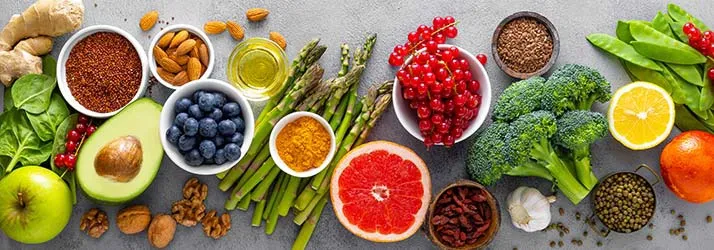Plant Based Diet: Protein Alternatives in Centennial CO

Did you know that Dr. Johnson has been a vegetarian for almost 30 years? His wife and two boys are vegetarian, as well. In addition, his wife was vegetarian all through both pregnancies of their boys. The boys have been vegetarian their whole lives. They often are asked, “how do you get enough protein without eating any meat?”
Are you looking to incorporate more plant-based foods in your daily diet? We have compiled a list of some of the plant-based foods that you can eat as meat protein alternatives in Centennial CO.
Quinoa – This is not only a good source of plant protein but also fiber. One cup cooked provides about 8 grams of protein and 5 grams of fiber. It contains all 8 essential amino acids, making it more nutritious than rice and couscous but just as filling.
Tofu – There are 10 grams of protein in 1/2 cup of tofu. It is also packed with calcium, selenium, manganese, iron, and magnesium. Unlike many animal sources of protein, tofu is low in saturated fat and is a good source of heart-healthy unsaturated fats.
Mushrooms – Have twice the amount of protein compared to most vegetables. 1 medium white mushroom (18 g) has 0.6 g of protein.
Lentils – One cup of cooked lentils has nearly 18g of protein-more than the amount in a hamburger. Lentils are also an excellent source of B vitamins, iron, magnesium, potassium and zinc.
Edamame – There are 17 g of protein in 1 c of edamame. Unlike most plant proteins, they provide all the essential amino acids your body needs. It contains complete protein and provides all of the essential amino acids that people need and which the body cannot produce itself.
Almonds – One cup of almonds provides more protein than an egg.
Chickpeas – A 1-ounce serving provides about 3 grams of protein. They are the main ingredient in hummus and are delicious when used to make veggie burgers.
Watercress – One cup of watercress contains 0.8 g of protein. It is a cruciferous plant that grows in water and is high in protein per calorie.
Alfalfa Sprouts – One cup of alfalfa sprouts contains 1.3 g of protein. They can reduce cholesterol levels and are a rich source of vitamin K.
Spinach – One cup of raw spinach contains 0.7 g of protein.The protein in spinach contains all essential amino acids.Some research has shown that eating spinach will lower the risk of some cancers.
Asparagus – One cup of asparagus contains 3 g of protein.
Broccoli – One cup of chopped broccoli contains 2.5 g of protein. It has been shown to help with liver health, lower cholesterol levels and even reduce the risk of cancer.
Brussels Sprouts – One cup contains 3 g of protein. They are also very rich in vitamins C and K and are a good source of folate and vitamin B-6.
SOMETHING TO THINK ABOUT in Centennial CO
Even though vegetables may not have as high of protein amounts per gram, the calorie content is much lower. Not to mention the health benefits and amazing amounts of vitamins, minerals and amino acids found in eating vegetables that aren’t in meat sources of protein. Animal products do contain saturated fat and higher levels of cholesterol than sources of plant proteins.

